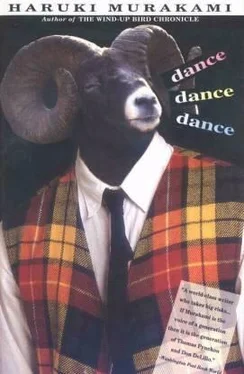All I could see outside the window of the early morning express train was snow. It was a bright, clear day, so the glare soon got to be too much. I didn't see another passenger looking out the windows. They all knew what snow looks like.
I'd skipped breakfast, so a little before noon I made my way to the dining car. Beer and an omelet. Across from me sat a fiftyish man in a suit and tie, having beer with a ham sandwich. He looked like a mechanical engineer, and that's just what he was. He spoke to me first, telling me he serviced jets for the Self-Defense Forces. Then he filled me in on how Soviet fighters and bombers invaded our airspace, though he didn't seem particularly upset about it. He was more concerned about the economics of F4 Phantoms. How much fuel they guzzled in one scramble, a terrible waste. «If the Japanese had made them, you can bet they'd be more efficient. And at no loss to performance either! There's no reason why we couldn't build a low-cost fighter if we wanted to.»
That's when I proffered my words of wisdom, that waste is the highest virtue one can achieve in advanced capitalist society. The fact that Japan bought Phantom jets from America and wasted vast quantities of fuel on scrambles put an extra spin in the global economy, and that extra spin lifted capitalism to yet greater heights. If you put an end to all the waste, mass panic would ensue and the global economy would go haywire. Waste is the fuel of contradiction, and contradiction activates the economy, and an active economy creates more waste.
Well, maybe so, the engineer admitted, but having been a wartime child who had to live under deprived conditions, he couldn't grasp what this new social structure meant. «Our generation, we're not like you young folks,» he said, straining a smile. «We don't understand these complex workings of yours.»
I couldn't say I exactly understood things either, but as I wasn't eager for the conversation to drag on, I kept quiet. No, I'm not used to things; I just recognize them for what they are. There's a decisive difference between those two propositions. Which is just as well, I supposed, as I finished my omelet and excused myself.
I slept for thirty minutes, and the rest of the trip I read a biography of Jack London I'd bought near the Hakodate station. Compared to the grand sweep and romance of Jack London's life, my existence seemed like a squirrel with its head against a walnut, dozing until spring. For the time being, that is. But that's how biographies are. I mean, who's going to read about the peaceful life and times of a nobody employed at the Kawasaki Municipal Library? In other words, what we seek is some kind of compensation for what we put up with.
Arriving at Sapporo, I decided to take a leisurely stroll to the hotel. It was a pleasant enough afternoon, and I was carrying only a shoulder bag.
The streets were covered in a thin layer of slush, and people trained their eyes carefully at their feet. The air was exhilarating. High school girls came bustling along, their rosy red cheeks puffing white breaths you could have written cartoon captions in. I continued my amble, taking in the sights of the town. It had been four and a half years since I was in Sapporo. It seemed like much longer.
Along the way I stopped into a coffee shop. All around me normal, everyday city types were going about their normal, everyday affairs. Lovers were whispering to each other, businessmen were poring over spread sheets, college kids were planning their next ski trip and discussing the new Police album. We could have been in any city in Japan. Transplant this coffee shop scene to Yokohama or Fukuoka and nothing would seem out of place. In spite of which—or, rather, all the more because—here I was, sitting in this coffee shop, drinking my coffee, feeling a desperate loneliness. I alone was the outsider. I had no place here.
Of course, by the same token, I couldn't really say I belonged to Tokyo and its coffee shops. But I had never felt this loneliness there. I could drink my coffee, read my book, pass the time of day without any special thought, all because I was part of the regular scenery. Here I had no ties to anyone. Fact is, I'd come to reclaim myself.
I paid the check and left. Then, without further thought, I headed for the hotel.
I didn't know the way exactly and part of me worried that I might miss the place. I didn't. How could anyone have? It had been transformed into a gleaming twenty-six-story Bauhaus Modern-Art Deco symphony of glass and steel, with flags of various nations waving along the driveway, smartly uniformed doormen hailing taxis, a glass elevator shooting up to a penthouse restaurant. A bas-relief of a dolphin was set into one of the marble columns by the entrance, beneath which the inscription read:
l'Hotel Dauphin
I stood there a good twenty seconds, mouth agape, staring up at it. Then I let out a long, deep breath that might as easily have been beamed straight to the moon. Surprise was not the word.
I couldn't stand around gawking at the facade forever. Whatever this building was, the address was correct, as was the name—for the most part. And anyway, I had a reservation, right? There was nothing to do but go in.
I walked up the gently sloped driveway and pushed my way through the shiny brass revolving door. The lobby was large enough to be a gymnasium, the ceiling at least two stories high. A wall of glass rose the full height, and through it cascaded a brilliant shower of sunlight. The floor space was appointed with a fleet of luxurious designer sofas, between which were stationed planters of ornamental trees. Lots of them. The overall decor focused on an oil painting—three tatami mats large—of some Hokkaido marshland. Nothing outstanding artistically, but impressive, if only for its size. At the far end of the lobby a posh coffee bar beckoned. The sort of place where you order a sandwich and they bring you four deviled ham dainties arrayed like calling cards on a silver tray with an embellishment of potato crisps and cornichons . Throw in a cup of coffee and you're spending enough to buy a frugal family of four a midday meal.
The lobby was crowded. Apparently a function was in progress. A group of well-dressed, middle-aged men sat on facing sofas, nodding and smiling magnanimously. Jaws thrust out, legs crossed, identically. A professional organization? Doctors or university professors? On their periphery—perhaps they were part of the same gathering—cooed a clutch of young women in formal dress, some of them in kimono, some in floor-length dresses. There were a few Westerners as well, not to mention the requisite salarymen in dark suits and harmless ties, attache cases in hand.
In a word, business was booming at the new Dolphin Hotel.
What we had here was a hotel founded on a proper outlay of capital and now enjoying proper returns. But how the hell had this come about? Well, I could guess, of course. Having once put together a PR bulletin for a hotel chain, I knew the whole process. Before a hotel of this scale is built, someone first costs out every aspect of the venture in detail, then consultants are called in and every piece of information is input into their computers for a thorough simulation study. Everything including the wholesale price and usage volume of toilet paper is taken into account. Then students are hired to go around the city—Sapporo in this case—to do a market survey. They stop young men and women on the street and ask how many weddings they expect to attend each year. You get the picture. Little is left unchecked. All in an effort to reduce business risk.
So the Hotel Dauphin project team had gone to great lengths over many months to draw up as precise a plan as possible. They bought the property, they assembled the staff, they pinned down flash advertising space. If money was all it took—and they were convinced they'd make that money back—there'd be no end of funds pouring in. It's big business of a big order.
Читать дальше












